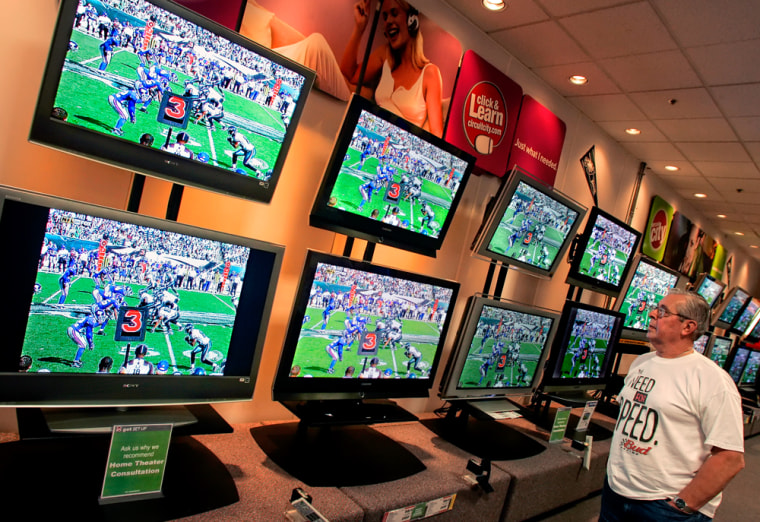A friend of mine just bought a new 42-inch plasma TV. Scott Sistek went to a well-known electronics store and found the set he wanted. But he was so turned off by the experience, he decided to go home and shop online.
“The sales staff was kind of overly pushy,” he says. “They kept trying to sell me the extended warranty and installation service.”
Searching the Web, Scott found several places that had the same TV for a lot less. He says his online shopping experience was “positive” and saved him about $500. “I would definitely do it again,” Scott says.
For its December issue, Consumer Reports asked nearly 20,000 readers where they get the best price and service when they buy electronics. The results: No matter what the product, more people prefer Web shopping.
Greg Daugherty, Consumer Reports Editor-At-Large, tells me the most surprising finding of the survey was that shopping for electronics online is not limited to small items, such as digital cameras and MP3 players. Even with large, big-ticket items, such as television sets, he says, “people are just happier buying it online.”
Consumer Reports found that for retailers with both walk-in and Web stores, the online store always scored higher in overall customer satisfaction.
What’s the problem with retailers?
One reason so many people prefer to go online is the less than favorable experiences they’ve had at big-name electronics stores. “There’s a real issue about the sales staff at big national chain stores,” Ron Conlin, a partner at J.D. Power and Associates tells me.
They are not “adequately trained,” and “cannot give shoppers the information they want in a low-pressure way,” Conlin says. “It’s a lot of high school seniors in their spare time trying to sell high-end consumer electronics.”
In its surveys, J.D. Power found that many shoppers are willing to pay more for a product if they get the knowledgeable one-on-one service they want. “For this reason,” Conlin notes, “specialty stores tend to outperform ‘big box’ retailers in satisfying customers.”
The Consumer Reports survey found the same thing – local, independent stores rated higher than any big name retailer.
And the winners are …
For online retailers, Crutchfield.com scored the highest in the Consumer Reports survey. It’s the only Internet retailer with above-average selection, product quality and online support. The other top-rated sites are: costco.com, buydig.com, amazon.com and buy.com. The magazine’s editors point out that buydig.com has the most limited return policy of the group (more on that below).
The Consumer Reports survey shows the top-rated chain stores for rock-bottom prices are: Costco and BJ’s Wholesale.
Ritz Camera (also known as Kits Camera in some areas), Tweeter and Ultimate Electronics got high marks for best in-store service and product selection.
Advice from a super shopper
My friend Edgar Dworsky runs the Web site ConsumerWorld.org. I don’t know a more frugal shopper on the planet. No matter where he shops, he always takes the time to read both professional reviews and customer reviews. He finds customer feedback especially important.
“It’s as if your next door neighbor has the thing you’re thinking of buying,” Dworsky says. “You get to find out their opinions before you buy.”
Dworsky admits some of these reviews might be from people who don’t know what they’re talking about, but he says if you see the same problem listed in comment after comment, you know it’s a genuine issue.
What’s the return policy?
Before you buy anything, check the store’s return policy. That’s especially important when making your purchase online. Return polices vary greatly. For instance, Costco has a very liberal policy. Except for computers, there is no time limit for bringing something back. Costco even lets you return an online purchase to their warehouse stores, which saves you on shipping charges.
On the other hand, buydig.com has a very limited return policy. Once the box is opened, you cannot return any DVD player, recorder, scanner, cell phone, fax machine, printer, receiver, or TV. Some video products cannot be returned even if they are defective. Instead, buydig.com says “they must be repaired by a service center of the manufacturer in your area.”
For items buydig.com will take back, you only have a 10-day window from the time you receive it. You must send the merchandise back in its original factory box, including all packing material. You even need to return the blister packaging, if there is any, even if it’s been opened.
Remember, most retailers – online and off – will charge you a restocking fee of up to 20 percent if the box has been opened, unless the product is defective.
Rebates
Rebates are a pain, but they’re part of the game if you’re looking for the best price. Some retailers make it a lot easier to get your money.
Staples, Costco and CompUSA let you apply for rebates online; just fill out the form. You don’t have to clip the UPC code or mail in the sales receipt.
Extended warranties
Consumer Reports has long advised against buying an extended warranty for most electronic items. The editors say they're almost always “a waste of money” because today's products are so reliable.
“They may provide you peace of mind, which may be worth it to you," Electronics Editor Paul Reynolds says. "But as a financial investment they're very unlikely to pay off."
The one exception is rear-projection microdisplay TVs. The editors say you should consider an extended warranty if you buy one of these sets, because their repair rate is three times higher than picture tube or flat-panel TVs.
Remember, the price of an extended warranty is negotiable and you don’t have to buy on the spot. If you decide to purchase this extra protection, don’t pay more than 15 percent of the item’s price.
Here’s what I do – I use a credit card that doubles the manufacturer’s warranty at no extra charge.
